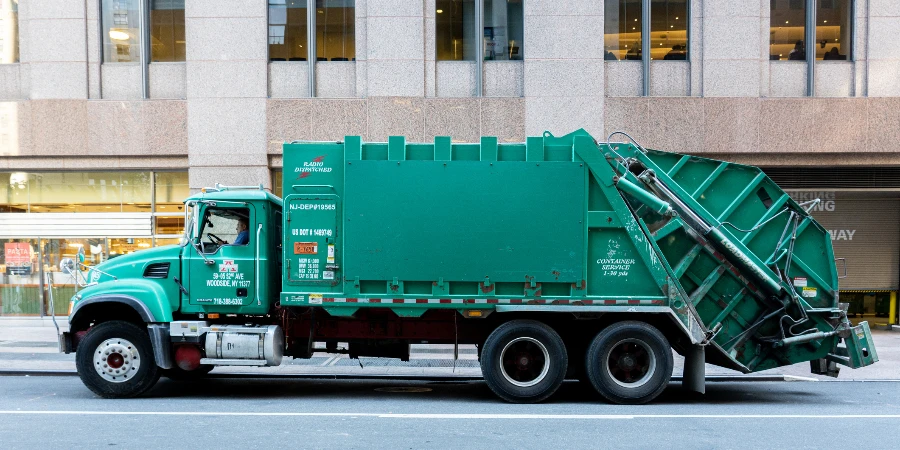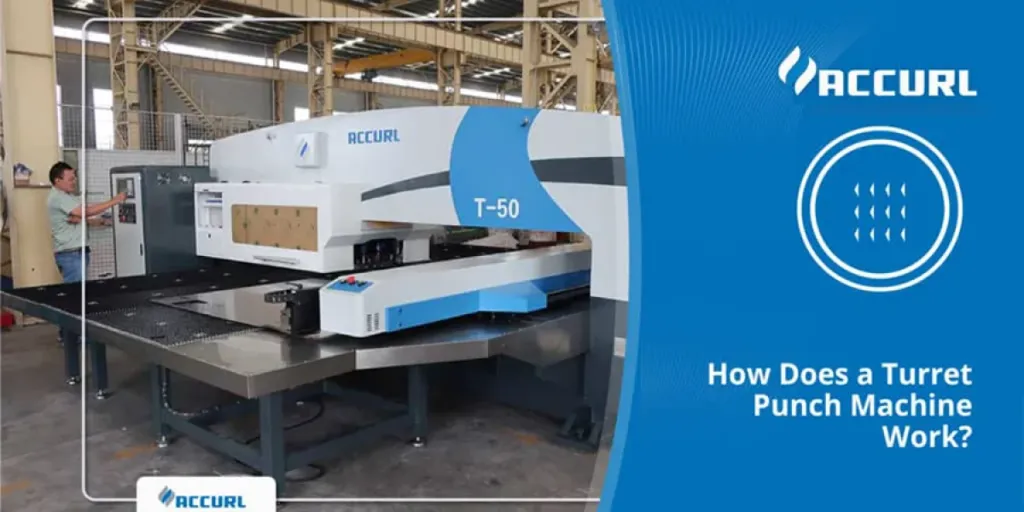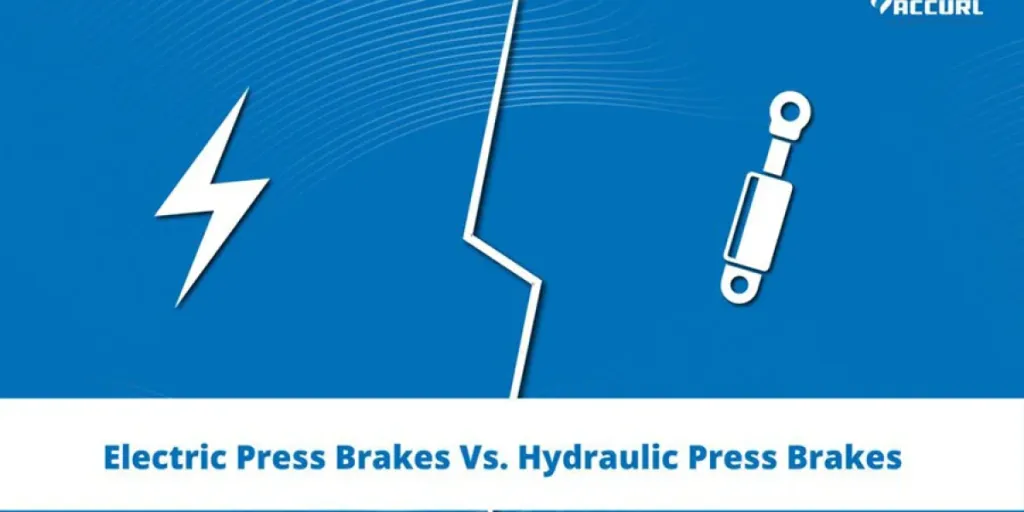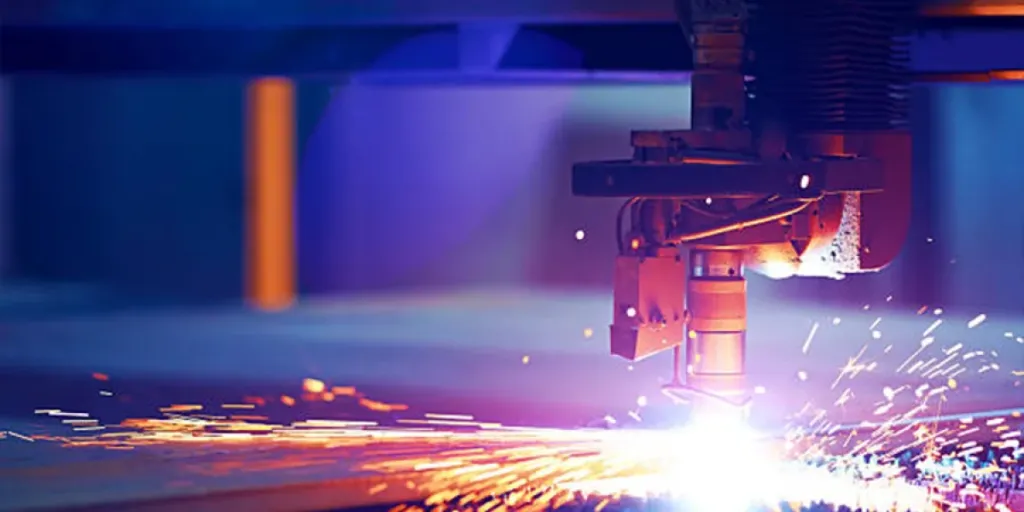في عام 2025، سيعمل الابتكار في شاحنات إدارة النفايات على تحويل الصناعة، مدفوعًا بالتحضر والاستدامة. تقدم هذه المقالة تحليلًا متعمقًا للمشترين المحترفين، مع التركيز على الأداء والتكنولوجيا واعتبارات التكلفة للمساعدة في اختيار الشاحنة المثالية.
جدول المحتويات:
– نظرة عامة على السوق: صناعة شاحنات القمامة لإدارة النفايات
- تحليل متعمق لسوق شاحنات القمامة لإدارة النفايات
- العوامل الرئيسية عند اختيار شاحنة القمامة لإدارة النفايات
– أحدث ميزات التكنولوجيا في شاحنات القمامة
- نطاق الأسعار واعتبارات الميزانية
- المتانة وعمر المنتج
- ملخص
نظرة عامة على السوق: صناعة شاحنات القمامة لإدارة النفايات
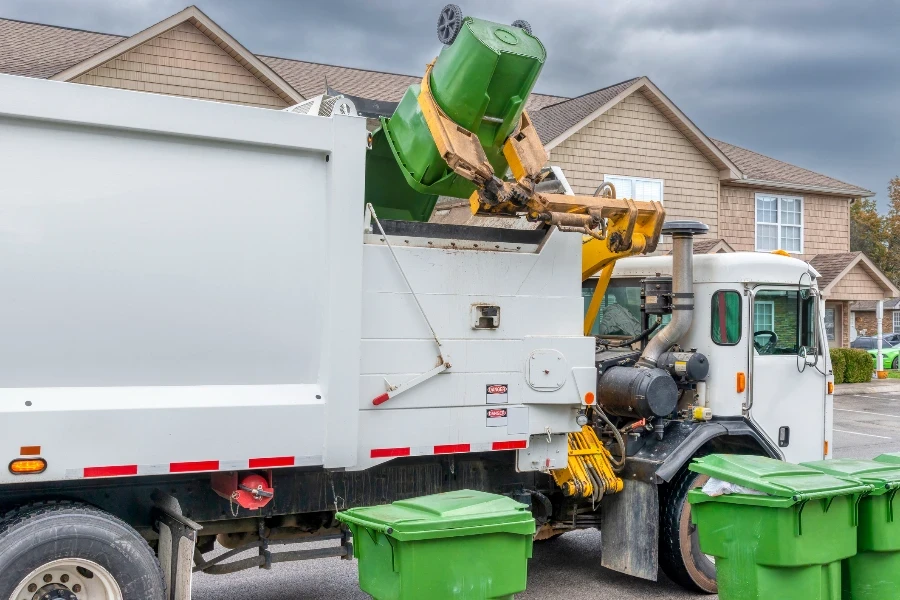
تُعَد سوق شاحنات القمامة لإدارة النفايات جزءًا حيويًا من صناعة المركبات المتخصصة. ومن المتوقع أن تصل قيمتها إلى 82.3 مليار دولار أمريكي في عام 2024، ومن المتوقع أن تصل إلى 99.8 مليار دولار أمريكي بحلول عام 2030، بنمو بمعدل نمو سنوي مركب يبلغ 3.3%. تلعب شاحنات القمامة دورًا حاسمًا في خدمات الصرف الصحي البلدية والصناعية، مدفوعة بالتوسع الحضري المتزايد واللوائح الصارمة لإدارة النفايات. تقود منطقة آسيا والمحيط الهادئ، وخاصة الصين والهند، السوق في النمو بسبب التطور الحضري السريع وإنفاذ قوانين الصرف الصحي.
تهيمن شاحنات القمامة التي تعمل بمحركات الاحتراق الداخلي على السوق بسبب قدرتها على التعامل مع الأحمال الثقيلة والعمل بشكل مستمر. ومع ذلك، هناك تحول متزايد نحو شاحنات القمامة الكهربائية، مدفوعًا بالمخاوف البيئية والحوافز الحكومية. على سبيل المثال، باعت الصين أكثر من 50,000 ألف مركبة كهربائية ثقيلة مؤخرًا، مما يشير إلى اتجاه كبير نحو الكهربة في قطاع إدارة النفايات.
إن التطورات التكنولوجية، مثل تتبع نظام تحديد المواقع العالمي (GPS)، ومراقبة البيانات في الوقت الفعلي، والضوابط الآلية، تعمل على تعزيز كفاءة عمليات إدارة النفايات. تعمل هذه الابتكارات على تحسين المسارات، وتقليل التكاليف التشغيلية، وتحسين الأداء العام. كما يشهد السوق زيادة في الطلب على شاحنات القمامة الذكية المجهزة بتقنية إنترنت الأشياء، والتي توفر رؤى في الوقت الفعلي لعمليات جمع النفايات والتخلص منها.
تحليل متعمق لسوق شاحنات القمامة لإدارة النفايات

تؤثر العديد من العوامل الرئيسية بشكل كبير على ديناميكيات السوق لشاحنات القمامة لإدارة النفايات. تتطلب زيادة التحضر والتصنيع أنظمة فعالة لجمع النفايات والتخلص منها. يتم تقسيم السوق حسب نوع الدفع، حيث تعد المركبات ذات محركات الاحتراق الداخلي والمركبات الكهربائية الفئات الرئيسية. تستمر شاحنات القمامة ذات محركات الاحتراق الداخلي، المعروفة بأدائها القوي وموثوقيتها، في الاحتفاظ بحصة كبيرة. ومع ذلك، فإن الدفع نحو الحلول المستدامة يدفع نمو شاحنات القمامة الكهربائية، التي توفر انبعاثات صفرية وتأثيرًا بيئيًا منخفضًا.
يتحول سلوك المستهلك نحو حلول إدارة النفايات الصديقة للبيئة بسبب زيادة الوعي والضغوط التنظيمية. ويتجلى هذا التحول في التبني المتزايد لشاحنات القمامة الكهربائية ودمج التقنيات المتقدمة لتعزيز الكفاءة التشغيلية. كما تتطور قنوات التوزيع، مع مزيج من المبيعات المباشرة والوكالات والمنصات عبر الإنترنت التي تلبي الاحتياجات المتنوعة للبلديات وشركات إدارة النفايات الخاصة.
تشمل الابتكارات الحديثة شاحنات القمامة الذكية المجهزة بأجهزة استشعار وميزات اتصال. توفر هذه الشاحنات بيانات في الوقت الفعلي عن مستويات النفايات، وتحسن مسارات التجميع، وتمكن الصيانة التنبؤية، مما يقلل من وقت التوقف عن العمل وتكاليف التشغيل. تمتد دورة حياة منتج شاحنات القمامة، مع تركيز الشركات المصنعة على التصميمات المتينة وسهلة الصيانة لتعزيز طول العمر والأداء.
وتشمل التأثيرات الاقتصادية على السوق الحوافز الحكومية للسيارات الكهربائية، وارتفاع تكاليف الوقود، وزيادة تكلفة الامتثال للقواعد البيئية. وتدفع هذه العوامل إلى تبني حلول أكثر كفاءة واستدامة لشاحنات القمامة. كما تعمل الاتجاهات الاجتماعية، مثل التركيز المتزايد على الاستدامة والمسؤولية الاجتماعية للشركات، على تشكيل ديناميكيات السوق، حيث تعطي الشركات والبلديات الأولوية لممارسات إدارة النفايات الصديقة للبيئة.
تشمل نقاط الضعف لدى العملاء في صناعة إدارة النفايات التكاليف التشغيلية المرتفعة وعمليات جمع النفايات غير الفعّالة والحاجة إلى معدات موثوقة ومتينة. ويعالج المصنعون هذه التحديات من خلال تقديم شاحنات قمامة متطورة بميزات مثل أنظمة التحميل الآلية والخزانات عالية السعة والمواد المقاومة للتآكل. وتركز استراتيجيات تحديد موقع العلامة التجارية والتمايز على الابتكار والاستدامة والموثوقية، مع تأكيد اللاعبين الرائدين على التزامهم بتوفير حلول متطورة لإدارة النفايات بكفاءة.
تشمل الأسواق المتخصصة في صناعة شاحنات القمامة لإدارة النفايات المركبات المتخصصة لجمع النفايات الخطرة، وشاحنات القمامة المدمجة للمناطق الحضرية ذات الشوارع الضيقة، والشاحنات ذات السعة العالية لإدارة النفايات الصناعية. توفر هذه القطاعات المتخصصة فرص نمو كبيرة للشركات المصنعة التي تتطلع إلى تلبية احتياجات العملاء المحددة والمتطلبات التنظيمية.
العوامل الرئيسية عند اختيار شاحنة القمامة لإدارة النفايات
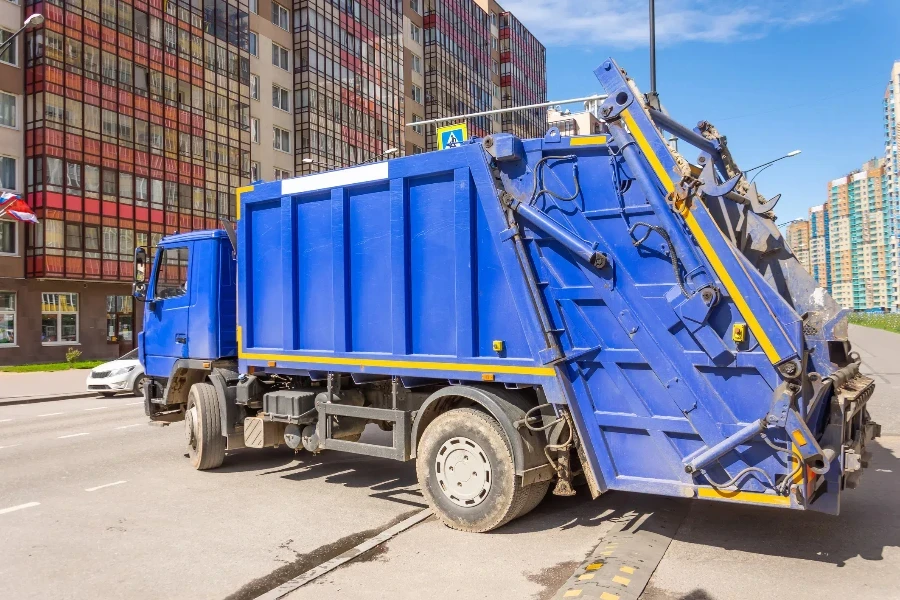
يتضمن اختيار شاحنة القمامة لإدارة النفايات العديد من العوامل الحاسمة لضمان الكفاءة والامتثال وطول العمر. يلعب كل جانب دورًا محوريًا في أداء الشاحنة وملاءمتها لاحتياجات إدارة النفايات المحددة.
أنواع وأنماط
تتوفر شاحنات القمامة لإدارة النفايات بأنواع وأنماط مختلفة، كل منها مصمم لسيناريوهات محددة لجمع النفايات. تشمل الأنواع الأكثر شيوعًا الشاحنات ذات التحميل الخلفي، والشاحنات ذات التحميل الأمامي، والشاحنات ذات التحميل الجانبي، والشاحنات ذات الرول أوف. تتحرك الشاحنات ذات التحميل الخلفي في المساحات الضيقة وتجمع النفايات من حاويات أصغر، ومجهزة برافعة هيدروليكية للتحميل اليدوي. تناسب الشاحنات ذات التحميل الأمامي جمع النفايات التجارية والصناعية بسعة كبيرة وآليات رفع آلية، مما يقلل من تكاليف العمالة. تجمع الشاحنات ذات التحميل الجانبي، والتي غالبًا ما تكون آلية، النفايات بكفاءة من الصناديق القياسية في المناطق السكنية دون الحاجة إلى العمالة اليدوية. تنقل الشاحنات ذات التحميل الخلفي الحاويات الكبيرة، وهي ضرورية لمواقع البناء وعمليات التخلص من النفايات واسعة النطاق.
الأداء والوظيفة
إن أداء ووظائف شاحنة القمامة أمر بالغ الأهمية لإدارة النفايات بشكل فعال. تشمل مقاييس الأداء الحاسمة سعة التحميل وكفاءة الوقود وقوة النظام الهيدروليكي. تؤثر سعة التحميل على عدد الرحلات المطلوبة وكفاءة التشغيل الإجمالية. تعد كفاءة الوقود أمرًا حيويًا، خاصة مع ارتفاع تكاليف الوقود واللوائح البيئية. غالبًا ما تتميز شاحنات القمامة الحديثة بمحركات متقدمة تعمل على تحسين استهلاك الوقود مع تقليل الانبعاثات. تضمن قوة النظام الهيدروليكي التشغيل الفعال لآليات الرفع، والتعامل مع أثقل الصناديق بسهولة.
بيانات المعدة
إن فهم المواصفات الفنية لشاحنة القمامة أمر ضروري لاتخاذ قرار مستنير. تشمل المواصفات الرئيسية نوع المحرك وناقل الحركة ونظام التعليق وأنظمة الكبح. يحدد نوع المحرك والقوة أداء الشاحنة، حيث تعد محركات الديزل الأكثر شيوعًا بسبب متانتها وقوتها. ومع ذلك، تكتسب المحركات الكهربائية والهجينة شعبية بسبب فوائدها البيئية وتكاليف التشغيل المنخفضة. تؤثر خيارات ناقل الحركة، مثل اليدوي أو الأوتوماتيكي، على سهولة القيادة ومتطلبات الصيانة. تعمل أنظمة التعليق، بما في ذلك نوابض الأوراق أو التعليق الهوائي، على راحة الركوب وقدرات التعامل مع الحمولة. تعمل أنظمة الكبح، وخاصة تلك التي تحتوي على ميزات متقدمة مثل الفرامل المانعة للانغلاق (ABS)، على تعزيز السلامة والتحكم.
معايير وشهادات السلامة
إن الالتزام بمعايير السلامة والشهادات أمر غير قابل للتفاوض عند اختيار شاحنة القمامة. إن التأكد من أن الشاحنة تلبي جميع لوائح السلامة ذات الصلة يحمي كل من المشغلين والجمهور. أصبحت ميزات السلامة مثل كاميرات النسخ الاحتياطي وأجهزة استشعار القرب وأنظمة الكبح الأوتوماتيكية قياسية بشكل متزايد في شاحنات القمامة الحديثة. تساعد هذه الميزات في منع الحوادث والإصابات أثناء التشغيل. بالإضافة إلى ذلك، تؤكد الشهادات من الهيئات المعترف بها، مثل وزارة النقل (DOT) أو وكالة حماية البيئة (EPA)، أن الشاحنة تلبي معايير السلامة والبيئة الصارمة.
أحدث ميزات التكنولوجيا في شاحنات القمامة

تتطور صناعة إدارة النفايات بسرعة مع دمج التكنولوجيا المتقدمة في شاحنات القمامة. تعمل هذه التطورات التكنولوجية على تعزيز الكفاءة والسلامة والاستدامة في عمليات جمع النفايات.
الأتمتة وتكامل الذكاء الاصطناعي
لقد أحدثت الأتمتة والذكاء الاصطناعي ثورة في تشغيل شاحنات القمامة. يمكن تشغيل الشاحنات الآلية بواسطة سائق واحد، مما يقلل من تكاليف العمالة ويزيد من الكفاءة. يمكن لأنظمة الذكاء الاصطناعي تحسين طرق التجميع بناءً على بيانات حركة المرور في الوقت الفعلي ومستويات النفايات، مما يضمن جمع النفايات في الوقت المناسب وبكفاءة.
التتبع عن بعد ونظام تحديد المواقع العالمي (GPS)
أصبحت أنظمة التتبع عن بعد ونظام تحديد المواقع العالمي (GPS) الآن قياسية في شاحنات القمامة الحديثة، حيث توفر بيانات في الوقت الفعلي عن موقع السيارة وسرعتها وحالتها التشغيلية. تمكن هذه التكنولوجيا شركات إدارة النفايات من مراقبة أسطولها وتحسين المسارات وتقليل استهلاك الوقود. بالإضافة إلى ذلك، يمكن لأنظمة التتبع عن بعد توفير بيانات تشخيصية، مما يسمح بالصيانة التنبؤية وتقليل وقت التوقف.
المحركات الكهربائية والهجينة
مع التركيز المتزايد على الاستدامة، أصبحت شاحنات القمامة الكهربائية والهجينة أكثر انتشارًا. توفر هذه الشاحنات تخفيضات كبيرة في الانبعاثات وتكاليف التشغيل مقارنة بالشاحنات التقليدية التي تعمل بالديزل. لقد أدى التقدم في تكنولوجيا البطاريات إلى تحسين مدى وأداء الشاحنات الكهربائية، مما يجعلها خيارًا قابلاً للتطبيق لجمع النفايات الحضرية.
ميزات السلامة المحسنة
السلامة هي أولوية قصوى في صناعة إدارة النفايات، وقد تم تجهيز شاحنات القمامة الحديثة بميزات أمان متقدمة. وتشمل هذه الميزات أنظمة تجنب الاصطدام، وكاميرات بزاوية 360 درجة، وأجهزة استشعار اكتشاف المشاة. تساعد هذه التقنيات في منع الحوادث وحماية كل من المشغلين والجمهور.
النطاق السعري واعتبارات الميزانية

يمكن أن يختلف نطاق أسعار شاحنات القمامة بشكل كبير بناءً على نوعها وميزاتها وتقنيتها. يعد فهم التكاليف والاعتبارات المتعلقة بالميزانية أمرًا بالغ الأهمية لاتخاذ قرار مستنير.
تكلفة الشراء الأولية
إن التكلفة الأولية لشراء شاحنة قمامة تشكل استثمارًا كبيرًا لأي شركة لإدارة النفايات. يمكن أن تبدأ تكلفة شاحنات التحميل الخلفي الأساسية من حوالي 150,000 ألف دولار، في حين يمكن أن تتجاوز تكلفة شاحنات التحميل الجانبي الآلية المتقدمة والشاحنات الكهربائية 300,000 ألف دولار. من الضروري مراعاة الميزات والتكنولوجيا المضمنة في الشاحنة لتحديد ما إذا كانت التكلفة الأعلى مبررة.
تكاليف التشغيل والصيانة
تعتبر تكاليف التشغيل والصيانة نفقات مستمرة يجب أخذها في الاعتبار عند وضع الميزانية. يمكن أن تكون تكاليف الوقود كبيرة بالنسبة للشاحنات التي تعمل بالديزل، في حين توفر الشاحنات الكهربائية تكاليف وقود أقل ولكن قد تكون تكاليف استبدال البطارية الأولية أعلى. تشمل تكاليف الصيانة الخدمة المنتظمة واستبدال الأجزاء ووقت التوقف المحتمل. يمكن للشاحنات ذات أنظمة التشخيص المتقدمة أن تساعد في تقليل تكاليف الصيانة من خلال تمكين الصيانة التنبؤية.
خيارات التمويل والتأجير
يمكن أن تساعد خيارات التمويل والتأجير في إدارة التكلفة الأولية الكبيرة لشراء شاحنة قمامة. تقدم العديد من الشركات المصنعة والتجار خطط تمويل توزع التكلفة على عدة سنوات، مما يجعلها أكثر قابلية للإدارة. تتوفر أيضًا خيارات التأجير، مما يوفر المرونة ويسمح للشركات بتحديث أسطولها بانتظام دون عبء الملكية.
المتانة وعمر المنتج
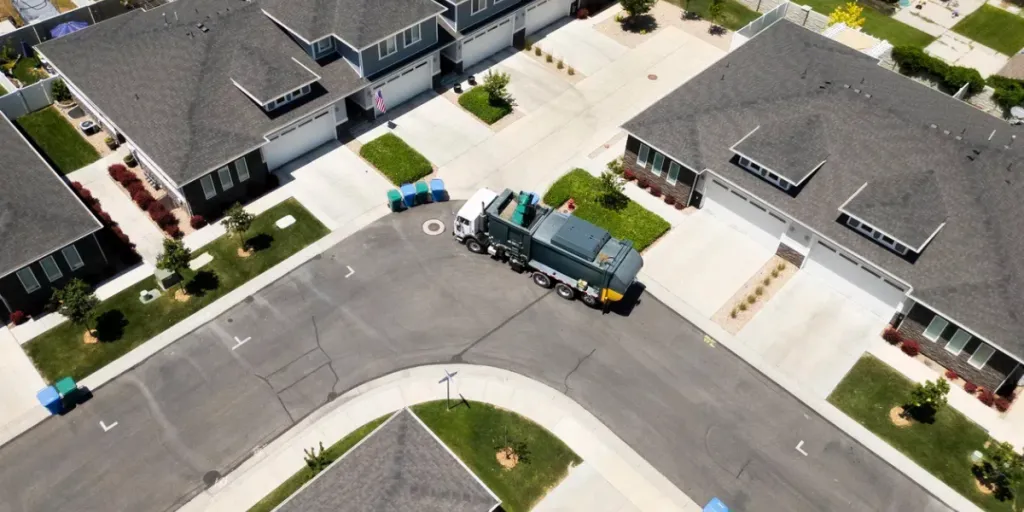
تعتبر المتانة وعمر المنتج من العوامل الحاسمة في اختيار شاحنة القمامة. تحدد هذه العوامل القيمة طويلة الأجل وموثوقية السيارة.
بناء الجودة والمواد
تؤثر جودة البناء والمواد المستخدمة في بناء شاحنة القمامة بشكل كبير على متانتها. الشاحنات المصنوعة من الفولاذ عالي القوة والمواد المقاومة للتآكل أكثر قدرة على تحمل قسوة جمع النفايات اليومية. كما تساهم الشاسيه المعززة وأنظمة التعليق القوية في إطالة عمر الشاحنة.
الضمان والدعم
غالبًا ما تقدم الشركات المصنعة ضمانات وخدمات دعم لضمان طول عمر وموثوقية شاحنات القمامة الخاصة بها. يمكن أن تغطي الضمانات مكونات مختلفة، بما في ذلك المحرك وناقل الحركة والأنظمة الهيدروليكية، مما يوفر راحة البال ويقلل من تكاليف الإصلاح غير المتوقعة. بالإضافة إلى ذلك، يعد الوصول إلى مراكز دعم وخدمة العملاء الموثوقة أمرًا ضروريًا للحفاظ على أداء الشاحنة.
قيمة اعادة البيع
تعتبر قيمة إعادة بيع شاحنة القمامة من الاعتبارات المهمة، خاصة بالنسبة للشركات التي تخطط لتحديث أسطولها بانتظام. من المرجح أن تحتفظ الشاحنات من الشركات المصنعة ذات السمعة الطيبة والتي تتمتع بسجل من الموثوقية والمتانة بقيمتها بشكل أفضل. كما يمكن للصيانة المنتظمة والتوثيق المناسب أن يعززا من قيمة إعادة البيع.
الملخص
يتطلب اختيار شاحنة القمامة المناسبة لإدارة النفايات دراسة متأنية لعوامل مختلفة، بما في ذلك الأنواع والأداء والتصميم وخصائص التكنولوجيا والسعر والمتانة ومعايير السلامة. من خلال تقييم هذه الجوانب بدقة، يمكن لشركات إدارة النفايات اتخاذ قرارات مستنيرة تعزز كفاءتها وسلامتها واستدامتها في عمليات جمع النفايات.
